Exploring the Purpose of Education: A Comprehensive Critical Review
VerifiedAdded on 2022/01/19
|5
|1938
|113
Essay
AI Summary
This essay undertakes a critical review of the purpose of education, examining its evolution and multifaceted objectives. The review explores the role of curriculum design, considering its impact on student development and societal needs. It delves into the influence of the grading system, analyzing its potential to undermine the true goals of education. The essay synthesizes diverse perspectives from various studies and authors, including Ammons, Driscoll, Wood, Burgess, Dewey, and Wagner, to provide a comprehensive understanding of the changing landscape of education. The analysis considers the importance of character development, cultural preservation, and the cultivation of critical thinking skills. Ultimately, the review argues that the purpose of education should be centered on fostering articulate, expressive thinkers and lifelong learners who are socially responsible and active global citizens, with a focus on individual talent and community welfare.
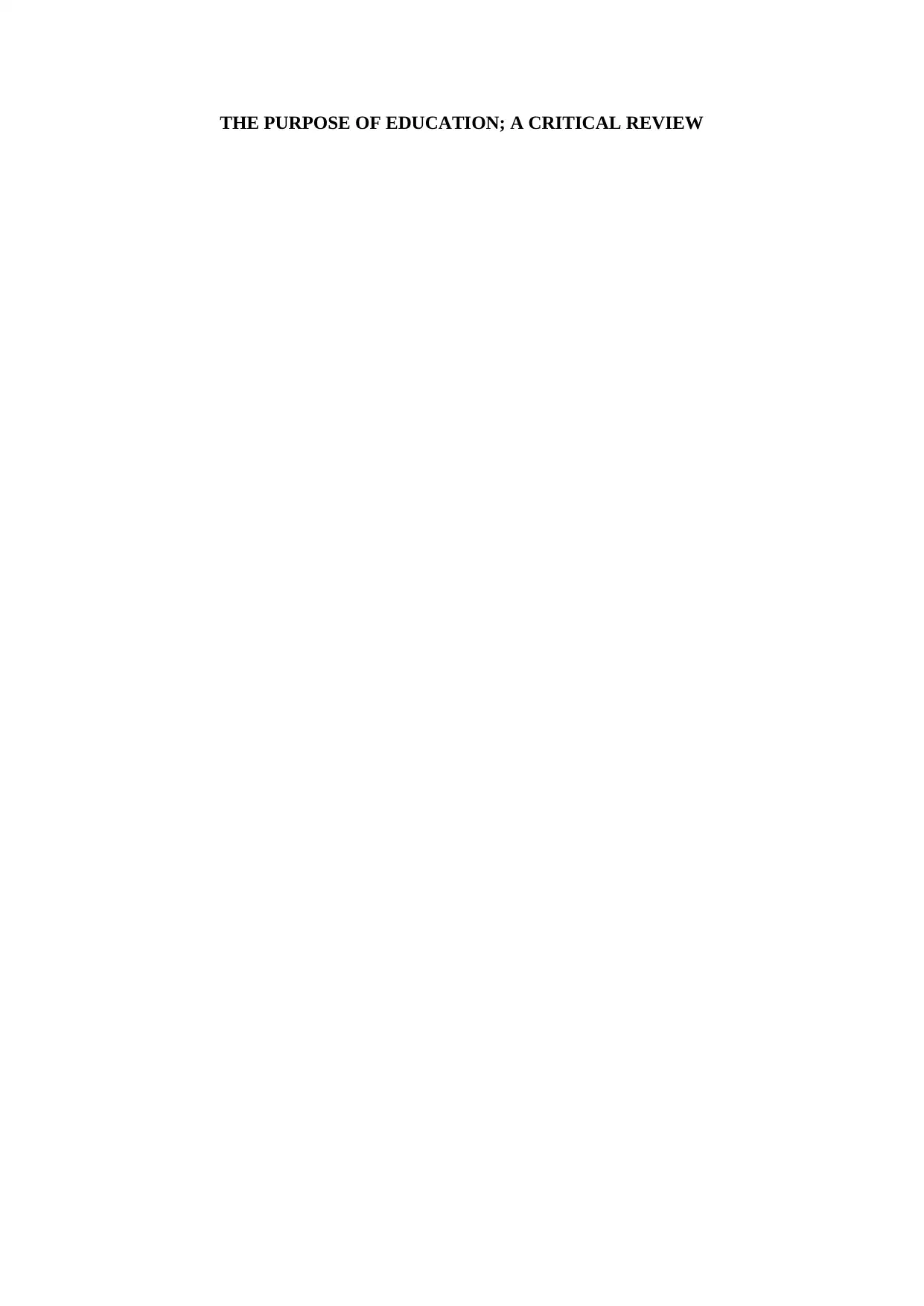
THE PURPOSE OF EDUCATION; A CRITICAL REVIEW
Paraphrase This Document
Need a fresh take? Get an instant paraphrase of this document with our AI Paraphraser
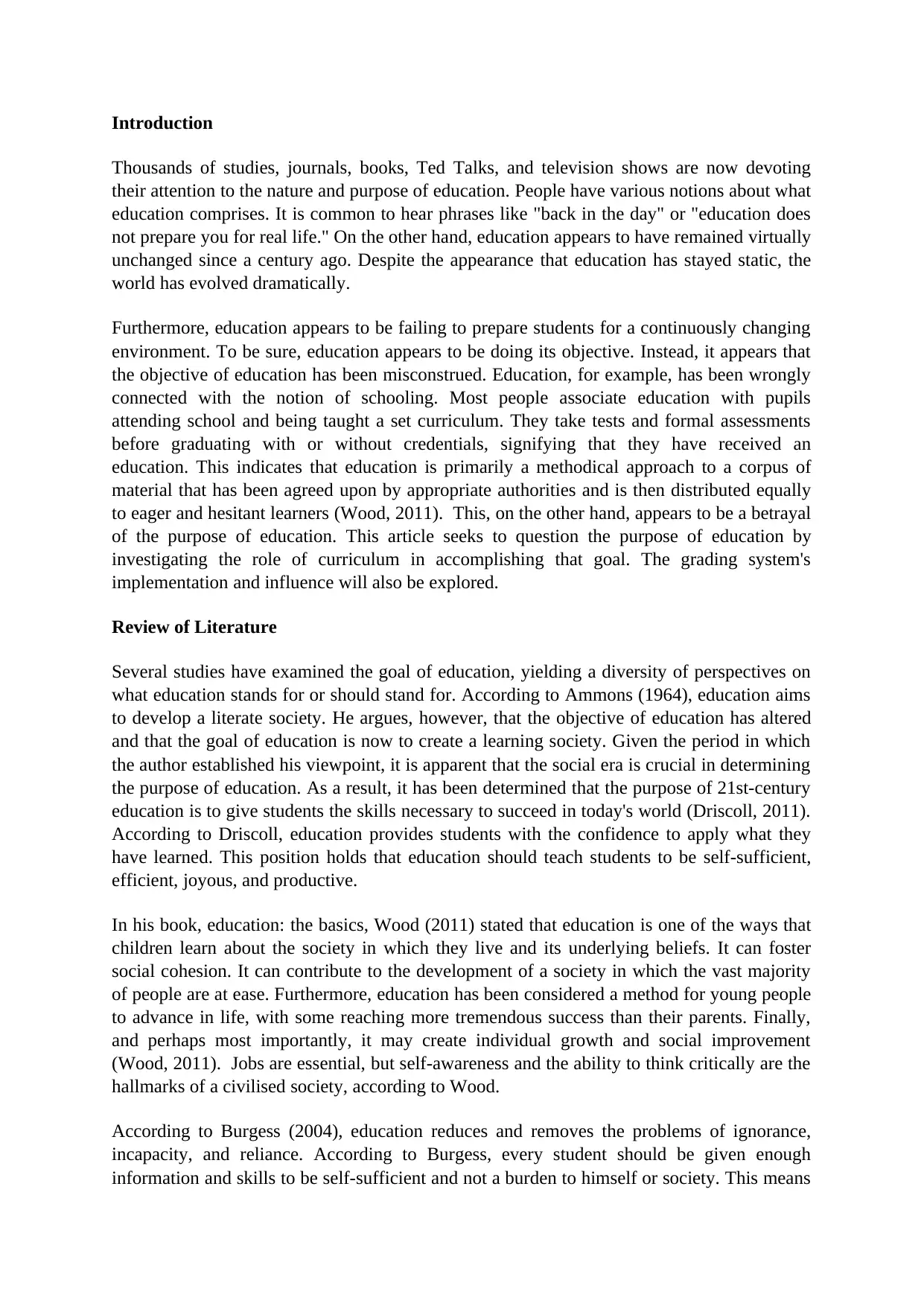
Introduction
Thousands of studies, journals, books, Ted Talks, and television shows are now devoting
their attention to the nature and purpose of education. People have various notions about what
education comprises. It is common to hear phrases like "back in the day" or "education does
not prepare you for real life." On the other hand, education appears to have remained virtually
unchanged since a century ago. Despite the appearance that education has stayed static, the
world has evolved dramatically.
Furthermore, education appears to be failing to prepare students for a continuously changing
environment. To be sure, education appears to be doing its objective. Instead, it appears that
the objective of education has been misconstrued. Education, for example, has been wrongly
connected with the notion of schooling. Most people associate education with pupils
attending school and being taught a set curriculum. They take tests and formal assessments
before graduating with or without credentials, signifying that they have received an
education. This indicates that education is primarily a methodical approach to a corpus of
material that has been agreed upon by appropriate authorities and is then distributed equally
to eager and hesitant learners (Wood, 2011). This, on the other hand, appears to be a betrayal
of the purpose of education. This article seeks to question the purpose of education by
investigating the role of curriculum in accomplishing that goal. The grading system's
implementation and influence will also be explored.
Review of Literature
Several studies have examined the goal of education, yielding a diversity of perspectives on
what education stands for or should stand for. According to Ammons (1964), education aims
to develop a literate society. He argues, however, that the objective of education has altered
and that the goal of education is now to create a learning society. Given the period in which
the author established his viewpoint, it is apparent that the social era is crucial in determining
the purpose of education. As a result, it has been determined that the purpose of 21st-century
education is to give students the skills necessary to succeed in today's world (Driscoll, 2011).
According to Driscoll, education provides students with the confidence to apply what they
have learned. This position holds that education should teach students to be self-sufficient,
efficient, joyous, and productive.
In his book, education: the basics, Wood (2011) stated that education is one of the ways that
children learn about the society in which they live and its underlying beliefs. It can foster
social cohesion. It can contribute to the development of a society in which the vast majority
of people are at ease. Furthermore, education has been considered a method for young people
to advance in life, with some reaching more tremendous success than their parents. Finally,
and perhaps most importantly, it may create individual growth and social improvement
(Wood, 2011). Jobs are essential, but self-awareness and the ability to think critically are the
hallmarks of a civilised society, according to Wood.
According to Burgess (2004), education reduces and removes the problems of ignorance,
incapacity, and reliance. According to Burgess, every student should be given enough
information and skills to be self-sufficient and not a burden to himself or society. This means
Thousands of studies, journals, books, Ted Talks, and television shows are now devoting
their attention to the nature and purpose of education. People have various notions about what
education comprises. It is common to hear phrases like "back in the day" or "education does
not prepare you for real life." On the other hand, education appears to have remained virtually
unchanged since a century ago. Despite the appearance that education has stayed static, the
world has evolved dramatically.
Furthermore, education appears to be failing to prepare students for a continuously changing
environment. To be sure, education appears to be doing its objective. Instead, it appears that
the objective of education has been misconstrued. Education, for example, has been wrongly
connected with the notion of schooling. Most people associate education with pupils
attending school and being taught a set curriculum. They take tests and formal assessments
before graduating with or without credentials, signifying that they have received an
education. This indicates that education is primarily a methodical approach to a corpus of
material that has been agreed upon by appropriate authorities and is then distributed equally
to eager and hesitant learners (Wood, 2011). This, on the other hand, appears to be a betrayal
of the purpose of education. This article seeks to question the purpose of education by
investigating the role of curriculum in accomplishing that goal. The grading system's
implementation and influence will also be explored.
Review of Literature
Several studies have examined the goal of education, yielding a diversity of perspectives on
what education stands for or should stand for. According to Ammons (1964), education aims
to develop a literate society. He argues, however, that the objective of education has altered
and that the goal of education is now to create a learning society. Given the period in which
the author established his viewpoint, it is apparent that the social era is crucial in determining
the purpose of education. As a result, it has been determined that the purpose of 21st-century
education is to give students the skills necessary to succeed in today's world (Driscoll, 2011).
According to Driscoll, education provides students with the confidence to apply what they
have learned. This position holds that education should teach students to be self-sufficient,
efficient, joyous, and productive.
In his book, education: the basics, Wood (2011) stated that education is one of the ways that
children learn about the society in which they live and its underlying beliefs. It can foster
social cohesion. It can contribute to the development of a society in which the vast majority
of people are at ease. Furthermore, education has been considered a method for young people
to advance in life, with some reaching more tremendous success than their parents. Finally,
and perhaps most importantly, it may create individual growth and social improvement
(Wood, 2011). Jobs are essential, but self-awareness and the ability to think critically are the
hallmarks of a civilised society, according to Wood.
According to Burgess (2004), education reduces and removes the problems of ignorance,
incapacity, and reliance. According to Burgess, every student should be given enough
information and skills to be self-sufficient and not a burden to himself or society. This means
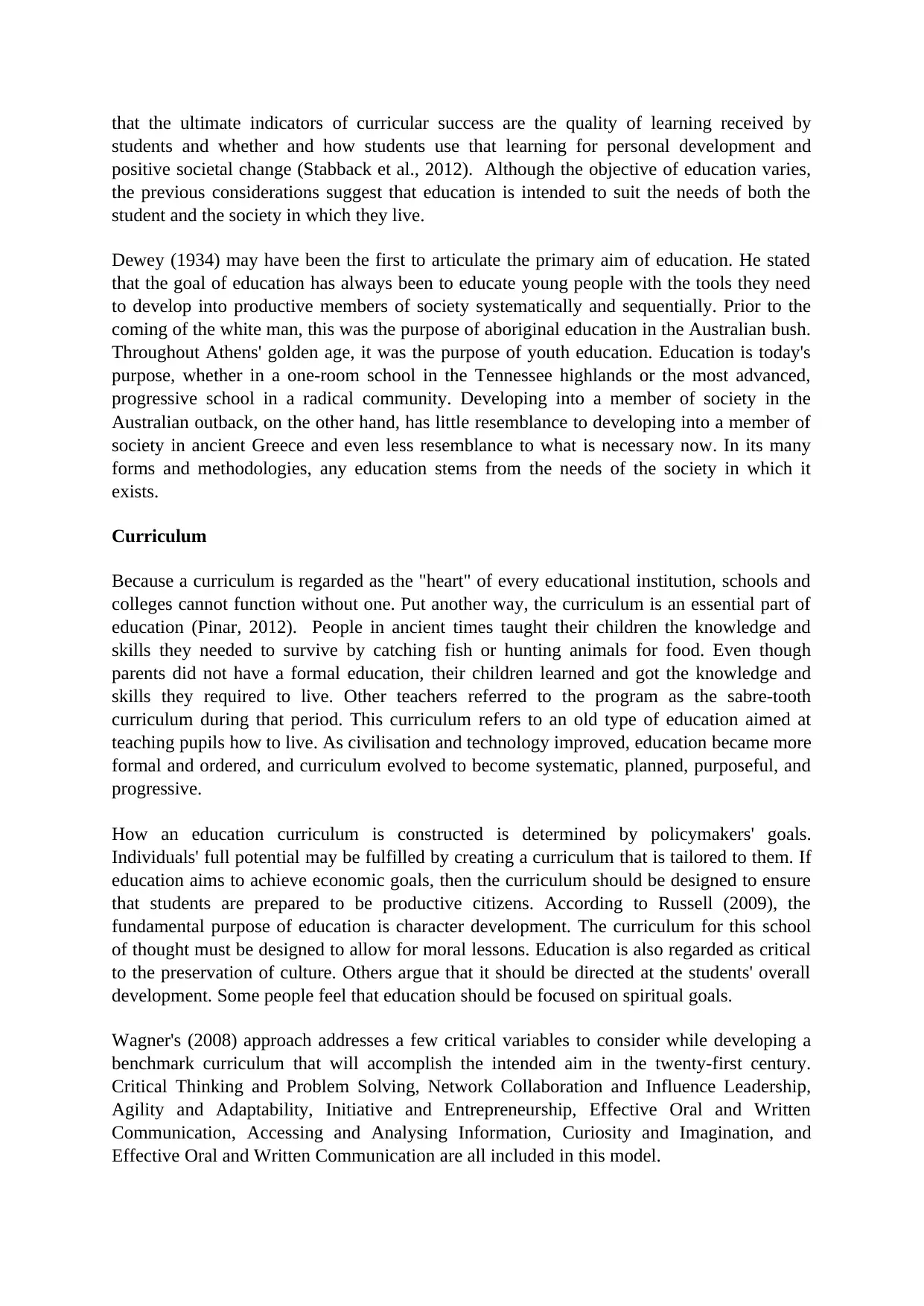
that the ultimate indicators of curricular success are the quality of learning received by
students and whether and how students use that learning for personal development and
positive societal change (Stabback et al., 2012). Although the objective of education varies,
the previous considerations suggest that education is intended to suit the needs of both the
student and the society in which they live.
Dewey (1934) may have been the first to articulate the primary aim of education. He stated
that the goal of education has always been to educate young people with the tools they need
to develop into productive members of society systematically and sequentially. Prior to the
coming of the white man, this was the purpose of aboriginal education in the Australian bush.
Throughout Athens' golden age, it was the purpose of youth education. Education is today's
purpose, whether in a one-room school in the Tennessee highlands or the most advanced,
progressive school in a radical community. Developing into a member of society in the
Australian outback, on the other hand, has little resemblance to developing into a member of
society in ancient Greece and even less resemblance to what is necessary now. In its many
forms and methodologies, any education stems from the needs of the society in which it
exists.
Curriculum
Because a curriculum is regarded as the "heart" of every educational institution, schools and
colleges cannot function without one. Put another way, the curriculum is an essential part of
education (Pinar, 2012). People in ancient times taught their children the knowledge and
skills they needed to survive by catching fish or hunting animals for food. Even though
parents did not have a formal education, their children learned and got the knowledge and
skills they required to live. Other teachers referred to the program as the sabre-tooth
curriculum during that period. This curriculum refers to an old type of education aimed at
teaching pupils how to live. As civilisation and technology improved, education became more
formal and ordered, and curriculum evolved to become systematic, planned, purposeful, and
progressive.
How an education curriculum is constructed is determined by policymakers' goals.
Individuals' full potential may be fulfilled by creating a curriculum that is tailored to them. If
education aims to achieve economic goals, then the curriculum should be designed to ensure
that students are prepared to be productive citizens. According to Russell (2009), the
fundamental purpose of education is character development. The curriculum for this school
of thought must be designed to allow for moral lessons. Education is also regarded as critical
to the preservation of culture. Others argue that it should be directed at the students' overall
development. Some people feel that education should be focused on spiritual goals.
Wagner's (2008) approach addresses a few critical variables to consider while developing a
benchmark curriculum that will accomplish the intended aim in the twenty-first century.
Critical Thinking and Problem Solving, Network Collaboration and Influence Leadership,
Agility and Adaptability, Initiative and Entrepreneurship, Effective Oral and Written
Communication, Accessing and Analysing Information, Curiosity and Imagination, and
Effective Oral and Written Communication are all included in this model.
students and whether and how students use that learning for personal development and
positive societal change (Stabback et al., 2012). Although the objective of education varies,
the previous considerations suggest that education is intended to suit the needs of both the
student and the society in which they live.
Dewey (1934) may have been the first to articulate the primary aim of education. He stated
that the goal of education has always been to educate young people with the tools they need
to develop into productive members of society systematically and sequentially. Prior to the
coming of the white man, this was the purpose of aboriginal education in the Australian bush.
Throughout Athens' golden age, it was the purpose of youth education. Education is today's
purpose, whether in a one-room school in the Tennessee highlands or the most advanced,
progressive school in a radical community. Developing into a member of society in the
Australian outback, on the other hand, has little resemblance to developing into a member of
society in ancient Greece and even less resemblance to what is necessary now. In its many
forms and methodologies, any education stems from the needs of the society in which it
exists.
Curriculum
Because a curriculum is regarded as the "heart" of every educational institution, schools and
colleges cannot function without one. Put another way, the curriculum is an essential part of
education (Pinar, 2012). People in ancient times taught their children the knowledge and
skills they needed to survive by catching fish or hunting animals for food. Even though
parents did not have a formal education, their children learned and got the knowledge and
skills they required to live. Other teachers referred to the program as the sabre-tooth
curriculum during that period. This curriculum refers to an old type of education aimed at
teaching pupils how to live. As civilisation and technology improved, education became more
formal and ordered, and curriculum evolved to become systematic, planned, purposeful, and
progressive.
How an education curriculum is constructed is determined by policymakers' goals.
Individuals' full potential may be fulfilled by creating a curriculum that is tailored to them. If
education aims to achieve economic goals, then the curriculum should be designed to ensure
that students are prepared to be productive citizens. According to Russell (2009), the
fundamental purpose of education is character development. The curriculum for this school
of thought must be designed to allow for moral lessons. Education is also regarded as critical
to the preservation of culture. Others argue that it should be directed at the students' overall
development. Some people feel that education should be focused on spiritual goals.
Wagner's (2008) approach addresses a few critical variables to consider while developing a
benchmark curriculum that will accomplish the intended aim in the twenty-first century.
Critical Thinking and Problem Solving, Network Collaboration and Influence Leadership,
Agility and Adaptability, Initiative and Entrepreneurship, Effective Oral and Written
Communication, Accessing and Analysing Information, Curiosity and Imagination, and
Effective Oral and Written Communication are all included in this model.
⊘ This is a preview!⊘
Do you want full access?
Subscribe today to unlock all pages.

Trusted by 1+ million students worldwide
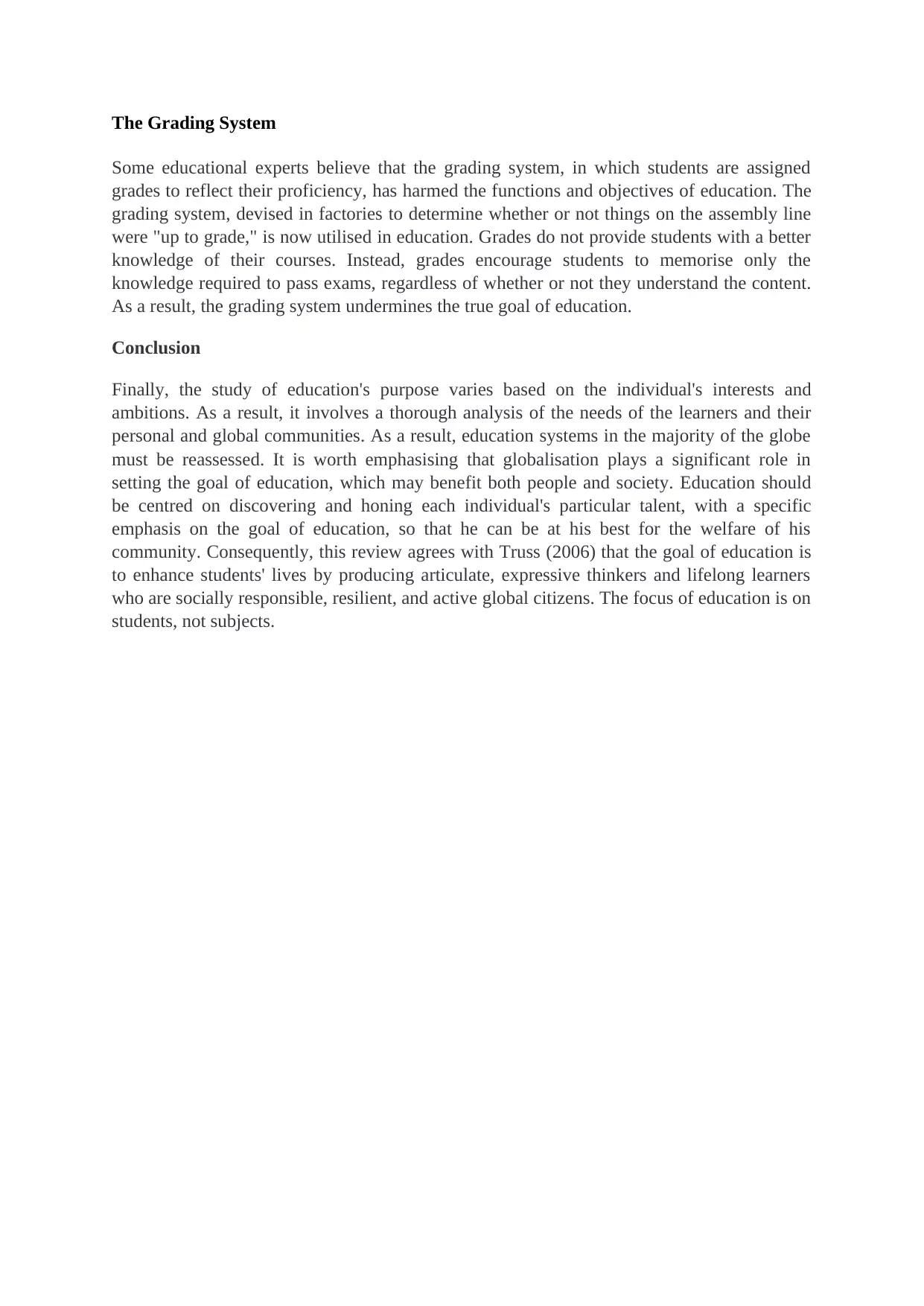
The Grading System
Some educational experts believe that the grading system, in which students are assigned
grades to reflect their proficiency, has harmed the functions and objectives of education. The
grading system, devised in factories to determine whether or not things on the assembly line
were "up to grade," is now utilised in education. Grades do not provide students with a better
knowledge of their courses. Instead, grades encourage students to memorise only the
knowledge required to pass exams, regardless of whether or not they understand the content.
As a result, the grading system undermines the true goal of education.
Conclusion
Finally, the study of education's purpose varies based on the individual's interests and
ambitions. As a result, it involves a thorough analysis of the needs of the learners and their
personal and global communities. As a result, education systems in the majority of the globe
must be reassessed. It is worth emphasising that globalisation plays a significant role in
setting the goal of education, which may benefit both people and society. Education should
be centred on discovering and honing each individual's particular talent, with a specific
emphasis on the goal of education, so that he can be at his best for the welfare of his
community. Consequently, this review agrees with Truss (2006) that the goal of education is
to enhance students' lives by producing articulate, expressive thinkers and lifelong learners
who are socially responsible, resilient, and active global citizens. The focus of education is on
students, not subjects.
Some educational experts believe that the grading system, in which students are assigned
grades to reflect their proficiency, has harmed the functions and objectives of education. The
grading system, devised in factories to determine whether or not things on the assembly line
were "up to grade," is now utilised in education. Grades do not provide students with a better
knowledge of their courses. Instead, grades encourage students to memorise only the
knowledge required to pass exams, regardless of whether or not they understand the content.
As a result, the grading system undermines the true goal of education.
Conclusion
Finally, the study of education's purpose varies based on the individual's interests and
ambitions. As a result, it involves a thorough analysis of the needs of the learners and their
personal and global communities. As a result, education systems in the majority of the globe
must be reassessed. It is worth emphasising that globalisation plays a significant role in
setting the goal of education, which may benefit both people and society. Education should
be centred on discovering and honing each individual's particular talent, with a specific
emphasis on the goal of education, so that he can be at his best for the welfare of his
community. Consequently, this review agrees with Truss (2006) that the goal of education is
to enhance students' lives by producing articulate, expressive thinkers and lifelong learners
who are socially responsible, resilient, and active global citizens. The focus of education is on
students, not subjects.
Paraphrase This Document
Need a fresh take? Get an instant paraphrase of this document with our AI Paraphraser
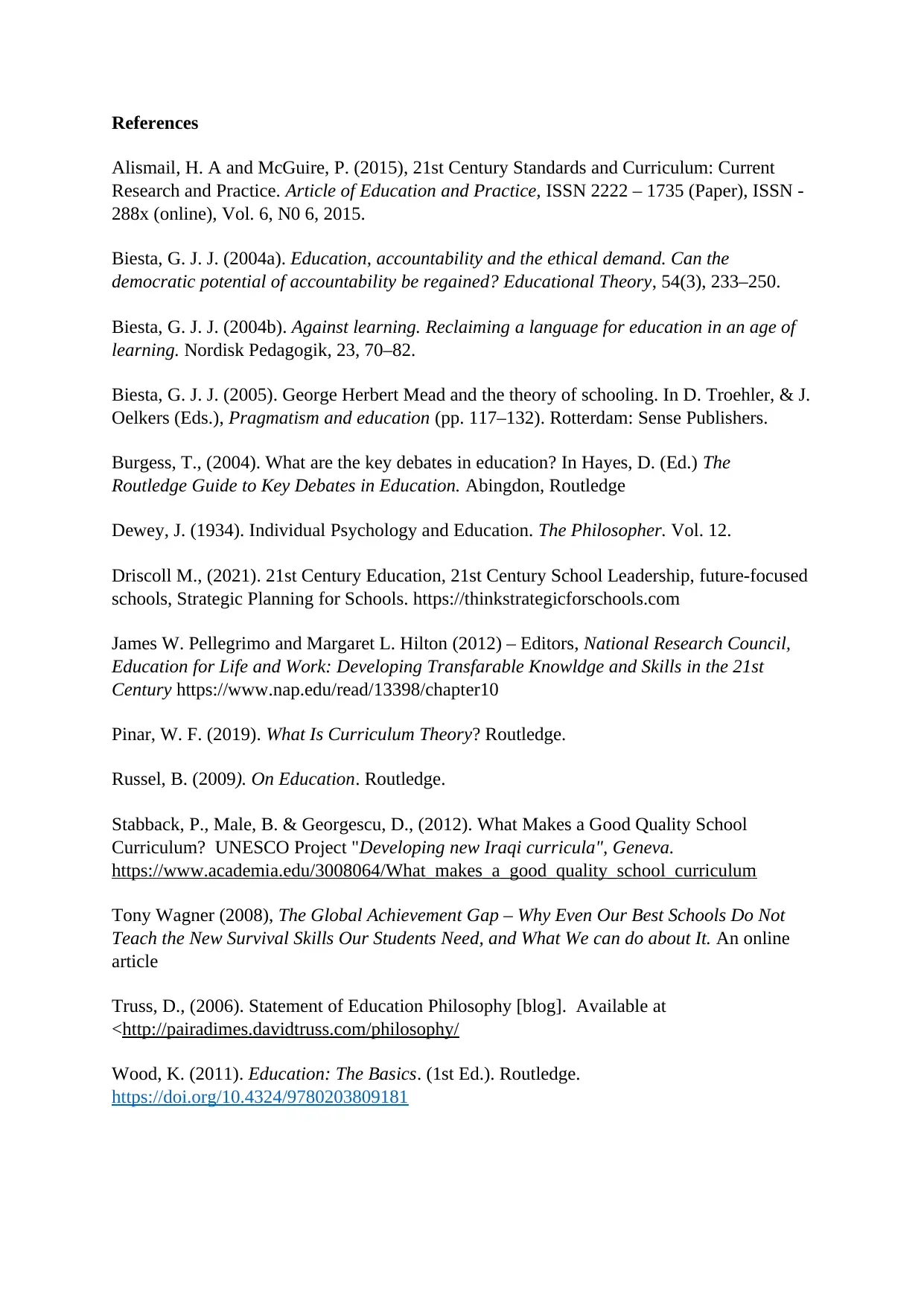
References
Alismail, H. A and McGuire, P. (2015), 21st Century Standards and Curriculum: Current
Research and Practice. Article of Education and Practice, ISSN 2222 – 1735 (Paper), ISSN -
288x (online), Vol. 6, N0 6, 2015.
Biesta, G. J. J. (2004a). Education, accountability and the ethical demand. Can the
democratic potential of accountability be regained? Educational Theory, 54(3), 233–250.
Biesta, G. J. J. (2004b). Against learning. Reclaiming a language for education in an age of
learning. Nordisk Pedagogik, 23, 70–82.
Biesta, G. J. J. (2005). George Herbert Mead and the theory of schooling. In D. Troehler, & J.
Oelkers (Eds.), Pragmatism and education (pp. 117–132). Rotterdam: Sense Publishers.
Burgess, T., (2004). What are the key debates in education? In Hayes, D. (Ed.) The
Routledge Guide to Key Debates in Education. Abingdon, Routledge
Dewey, J. (1934). Individual Psychology and Education. The Philosopher. Vol. 12.
Driscoll M., (2021). 21st Century Education, 21st Century School Leadership, future-focused
schools, Strategic Planning for Schools. https://thinkstrategicforschools.com
James W. Pellegrimo and Margaret L. Hilton (2012) – Editors, National Research Council,
Education for Life and Work: Developing Transfarable Knowldge and Skills in the 21st
Century https://www.nap.edu/read/13398/chapter10
Pinar, W. F. (2019). What Is Curriculum Theory? Routledge.
Russel, B. (2009). On Education. Routledge.
Stabback, P., Male, B. & Georgescu, D., (2012). What Makes a Good Quality School
Curriculum? UNESCO Project "Developing new Iraqi curricula", Geneva.
https://www.academia.edu/3008064/What_makes_a_good_quality_school_curriculum
Tony Wagner (2008), The Global Achievement Gap – Why Even Our Best Schools Do Not
Teach the New Survival Skills Our Students Need, and What We can do about It. An online
article
Truss, D., (2006). Statement of Education Philosophy [blog]. Available at
<http://pairadimes.davidtruss.com/philosophy/
Wood, K. (2011). Education: The Basics. (1st Ed.). Routledge.
https://doi.org/10.4324/9780203809181
Alismail, H. A and McGuire, P. (2015), 21st Century Standards and Curriculum: Current
Research and Practice. Article of Education and Practice, ISSN 2222 – 1735 (Paper), ISSN -
288x (online), Vol. 6, N0 6, 2015.
Biesta, G. J. J. (2004a). Education, accountability and the ethical demand. Can the
democratic potential of accountability be regained? Educational Theory, 54(3), 233–250.
Biesta, G. J. J. (2004b). Against learning. Reclaiming a language for education in an age of
learning. Nordisk Pedagogik, 23, 70–82.
Biesta, G. J. J. (2005). George Herbert Mead and the theory of schooling. In D. Troehler, & J.
Oelkers (Eds.), Pragmatism and education (pp. 117–132). Rotterdam: Sense Publishers.
Burgess, T., (2004). What are the key debates in education? In Hayes, D. (Ed.) The
Routledge Guide to Key Debates in Education. Abingdon, Routledge
Dewey, J. (1934). Individual Psychology and Education. The Philosopher. Vol. 12.
Driscoll M., (2021). 21st Century Education, 21st Century School Leadership, future-focused
schools, Strategic Planning for Schools. https://thinkstrategicforschools.com
James W. Pellegrimo and Margaret L. Hilton (2012) – Editors, National Research Council,
Education for Life and Work: Developing Transfarable Knowldge and Skills in the 21st
Century https://www.nap.edu/read/13398/chapter10
Pinar, W. F. (2019). What Is Curriculum Theory? Routledge.
Russel, B. (2009). On Education. Routledge.
Stabback, P., Male, B. & Georgescu, D., (2012). What Makes a Good Quality School
Curriculum? UNESCO Project "Developing new Iraqi curricula", Geneva.
https://www.academia.edu/3008064/What_makes_a_good_quality_school_curriculum
Tony Wagner (2008), The Global Achievement Gap – Why Even Our Best Schools Do Not
Teach the New Survival Skills Our Students Need, and What We can do about It. An online
article
Truss, D., (2006). Statement of Education Philosophy [blog]. Available at
<http://pairadimes.davidtruss.com/philosophy/
Wood, K. (2011). Education: The Basics. (1st Ed.). Routledge.
https://doi.org/10.4324/9780203809181
1 out of 5
Related Documents
Your All-in-One AI-Powered Toolkit for Academic Success.
+13062052269
info@desklib.com
Available 24*7 on WhatsApp / Email
![[object Object]](/_next/static/media/star-bottom.7253800d.svg)
Unlock your academic potential
Copyright © 2020–2026 A2Z Services. All Rights Reserved. Developed and managed by ZUCOL.





